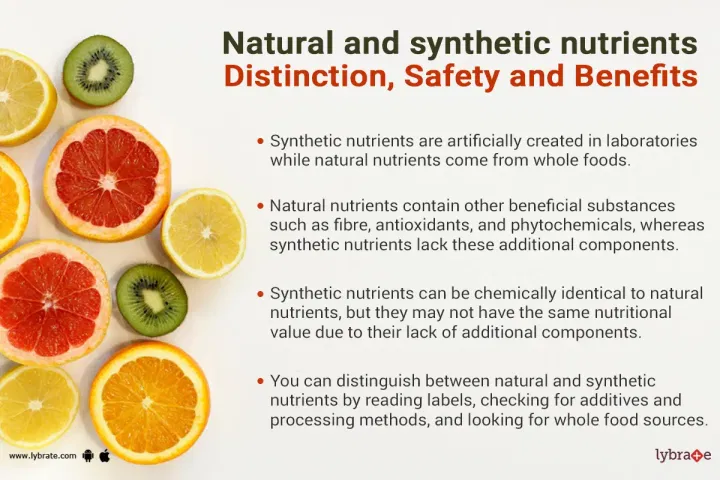Synthetic vs Natural Nutrients
Do you really think all of us are well-informed about the types of nutrients we take in our supplements? In fact, there is a lack of education for consumers in the dietary supplement industry when it comes to synthetic versus natural vitamins. This is indeed unfortunate, as there are a lot of people who do not know the difference between the two.
This lack of knowledge can be harmful to your health, as some synthetic vitamins may not be bioavailable or easily absorbed by the body. You must make sure that you are informed about the supplements you are taking so that you can make the best decisions for your health! This article will provide you with all the necessary information with respect to this subject, so keep reading until the end!
What's the Difference Between Natural and Synthetic Nutrients?
As their respective names suggest, synthetic nutrients are the ones that are essentially produced artificially in a laboratory, while natural nutrients are directly derived from natural (whole food) sources. It must be noted that the term 'nutrients' is used in the science of biology to denote the essential nutrients like carbohydrates, fat, protein, and vitamins.
These are the substances needed by all living organisms to support the growth and functioning of their bodies. In fact, it can be said that a constant supply of nutrients is required to keep them alive. Many people believe that natural vitamins are better for a person. However, this is not always the case.
Synthetic nutrients can be just as effective as the natural ones, and they may even be more bioavailable (able to be used by the body) at times. Being well-informed is the best way to determine whether a nutrient is right for you. In case you think you don't have enough knowledge about the subject, you must speak with a healthcare professional before using any nutrient.
How Can You Distinguish Between Natural and Synthetic Nutrients?
Natural nutrients are essentially found in whole food sources and are not processed or refined. Synthetic nutrients, on the other hand, are isolated nutrients that are usually created artificially with the help of an industrial process.
In other words, synthetic nutrients are those nutrients that are not, by any means, derived from natural sources, including whole foods. It must be noted that most supplements available on the market today are made artificially using synthetic nutrients. These nutrients include antioxidants, minerals, vitamins, and amino acids, among others.
These artificial nutrients can be taken in capsule, pill, tablet, powder, or liquid form. They are predominantly designed to mimic the actions that are otherwise initiated by natural nutrients in our bodies.
Furthermore, if you want to know if your supplement is synthetic or natural, all you have to do is check the label. Natural supplements usually list their food sources on the label or say that they are 100% plant- or animal-based. On the other hand, supplements that have the names of nutrients listed individually on the label, like vitamin C, or the ones that use chemical names—such as ascorbic acid, etc.—are most likely artificial or synthetic.
Are Synthetic Nutrients Safe (for Consumption) and Beneficial?
While more research needs to be conducted to ascertain the benefits of synthetic nutrients for healthy individuals, certain groups may benefit from supplementing with synthetic nutrients. For example, women who are already expecting or, for that matter, who are trying to conceive may benefit from taking folic acid supplements. Likewise, people who don't eat meat or dairy products may need to supplement with vitamin B12.
Some other groups of people that may need synthetic supplements include:
- The elderly are at a higher risk of vitamin D deficiency and may need more vitamin B12 and calcium for bone health
- Vegans and vegetarians are often at a higher risk for deficiency in certain vitamins and minerals, such as vitamin B12, calcium, zinc, iron, and vitamin D, as these nutrients are mainly found in animal products
- People who have nutrient deficiencies may benefit from taking dietary supplements (for example, iron supplements can help treat iron deficiency anemia)
- Women of childbearing age are often encouraged to take a folic acid supplement to reduce the risk of neural tube defects
Conclusion
We are often told to eat healthier and to make sure we are consuming enough essential nutrients from natural sources. However, this can be challenging for some people. The best way to deal with this challenge is to make sure you are consuming essential nutrients from synthetic sources.
This will give you the same essential nutrients you need to live. At the same time, you should also make sure you are eating a balanced diet. Moreover, when you are choosing supplements for your health and wellness, you need to consider your personal health factors, such as age, gender, health condition, etc., as well as your lifestyle factors, such as your daily activities, diet, and eating habits. The best way to find the right supplements for you is to consult with your doctor or a registered dietitian who can help you determine which supplements are best for you!



+1.svg)
